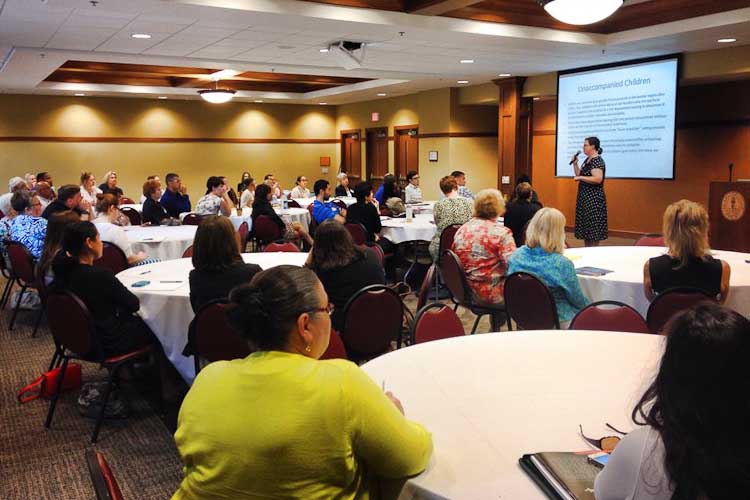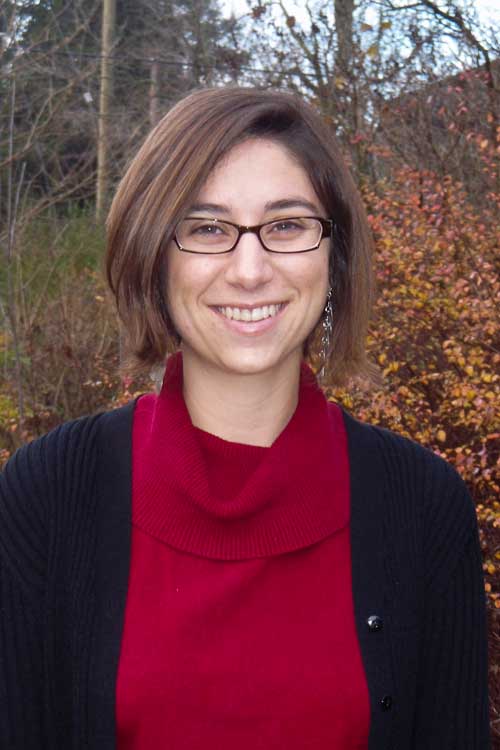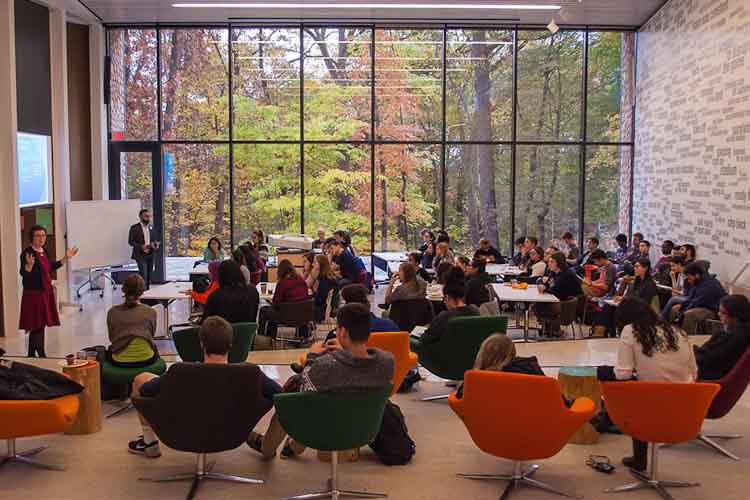Breaking down barriers to make immigrants and refugees feel welcome in Michigan
It may seem like swimming against a strong, rushing current at times, but Welcome Michigan is working to make the state a more friendly place for Immigrants and refugees. Kalamazoo is part of the program and Battle Creek is looking at it.
As Welcoming Michigan, an initiative of the Michigan Immigrants Rights Center, strives to make the state a welcoming place for immigrants and refugees by dismantling residents’ xenophobic sentiments, it has its work cut out for it. But when state leaders set a tone that fuels those negative sentiments, it makes the group’s work even harder.
Back in November, Governor Snyder was the first governor in the country to call for a halt in admitting Syrian refugees in response to the terror attacks in Paris. His commentary on the subject led to a domino effect, where dozens more governors called for the exclusion of Syrian refugees from being resettled in their communities. For a governor who describes himself as “one of the most ‘pro-immigration governors’ in the country”, this was a confounding back pedal.
In 2014, Snyder established the Michigan Office for New Americans, which has a goal of attracting and retaining highly skilled immigrants to the state. And just this past September — two months before his comments about halting refuge to Syrians in Michigan — Snyder was exploring steps to take in an even greater number of Syrian refugees. “Isn’t that part of being a good Michigander?” he asked reporters in Lansing at the time.
Snyder’s commentary and policies around advancing the place of immigrants in Michigan have historically hinged on the economic benefit that comes with bringing highly-skilled immigrants to the state.
In an article penned for Michigan Immigrants Rights Center, co-managing attorney, Susan Reed, says of the governor’s comments on restricting Syrian refugee resettlement in Michigan, “Refugees, Muslim refugees, in particular, have been unpopular in certain circles for a very long time and those are circles the Governor moves in.” Still, she expected more from a governor with pro-immigration policies and access to so many advocates and experts about immigration and refugee settlement at his fingertips.
Tackling the fears, head-on
Welcoming Michigan is an affiliate of the national, grassroots-driven collaborative, Welcoming America. The initiative uses a new approach to immigrant integration, which focuses on addressing the fears and concerns that U.S.-born Americans often associate with rapid local immigrant growth. Christine Sauvé, the Southeast Michigan coordinator of Welcoming Michigan says that even though jurisdiction over refugee resettlement is a federal process, the public commentary by state-elected officials does set the tone for the way a society views immigrants and refugees, and it certainly reinforces the fears associated with immigrant populations.
“In community settings across the state we have found that the governor’s remarks, and those of other politicians, have created unnecessary fear and anxiety,” Sauvé says. “The negative rhetoric has been particularly painful for Syrian Americans, refugees, and our Muslim friends and neighbors.
“Michigan has a long history of successfully and warmly welcoming refugees and immigrants,” she adds. “It would be a shame to close our minds and our hearts now because of fear. Immigrants and refugees are business owners, workers, volunteers, and contribute to our communities in so many ways.”
In response to the governor’s remarks in November, Welcoming Michigan created a pledge for elected officials who support welcoming refugees. The pledge acknowledges pride in Michigan’s diversity and the positive, necessary contribution to democracy, culture, and economy of all people of all backgrounds. It states a commitment to making Michigan a welcoming state for immigrants and refugees.
A total of 106 Michigan officials signed the pledge and 50 also visited refugee resettlement centers across the state Jan. 11. Kalamazoo County Commissioner Kevin Wordelman was one of them. Following his visit, he said, “The visit today was wonderful. I learned a lot about what’s happening in Battle Creek and the potential for what maybe can happen in Kalamazoo as the need for helping refugees settle and succeed here in America may increase in the next few years. What stood out to me the most, especially when we saw the class, is how energetic and excited and happy the students are. I can only imagine what courage it must take but they were really enthusiastic and to me, that was very inspiring.”
Welcoming Michigan, formed in 2011, is now made up of 11 Welcoming Cities and Counties — Detroit, Hamtramck, Sterling Heights, Clinton Township, Macomb County, West Bloomfield Township, Meridian Township, East Lansing, Lansing, Grand Rapids and Kalamazoo County.
Sauvé says that local communities approach Welcoming Michigan or Welcoming America to learn more about the program and what it means to be welcoming. The organization then provides city and county officials and community-based organizations with strategies and best practices for how to build a community climate that embraces and includes immigrant and refugee residents.
“The goal,” says Sauvé, “is to create an atmosphere where everyone feels respected and a part of the economic, social, and cultural fabric of the community. When a community joins the Welcoming Cities and Counties network they join a national and statewide network of communities who are all working on enhancing immigrant inclusion and eager to share ideas and learning.”
In January, Welcoming Michigan presented their campaign to Battle Creek city commissioners, who are reviewing the program for consideration there. Last year Kalamazoo County became a Welcoming County, and for the more than 12,000 foreign-born individuals in Kalamazoo County, Sauvé says, “they now live in a county, that has committed to improving access and inclusion for all immigrant residents.”
Each community works to advance different initiatives to serve the unique needs of those it is welcoming. Some cities improve access to services for English language learners, some support naturalization efforts, and some focus on improving relationships between longtime community members and recently arrived immigrants and refugees.
Tackling these various issues and needs at a local level is important because many barriers exist for immigrants and refugees as they attempt to integrate into various communities. Sauvé says a lot of the barriers are a simple lack of understanding about immigration and refugee resettlement. Welcoming Michigan creates opportunities for governments and organizations to learn about the processes.
Kalamazoo is currently working out a plan for the priorities it will implement in the coming years. Over the past year, Welcoming Michigan partnered with Kalamazoo County and local non-profits to offer seven presentations and workshops on the topics of immigration and welcoming immigrants.
The Welcoming Michigan communities of Southeast Michigan focus on making connections between U.S.-born residents and immigrants. Their efforts connect people in English as a Second Language classes, where residents can meet and practice conversation skills, with adult immigrant and refugee students learning English. Sauvé says that this is one of the important ways to break down unconscious biases that often exist as a result of physical segregation and unfamiliarity.
It can be intimidating and downright scary to immigrate or find refuge in the U.S. today when the cultural climate is inundated with fear based around the unknown of “otherness.” Sauvé says that immigrant and refugee residents let Welcoming Michigan know that they appreciate welcoming efforts.
“Many immigrants who have been here a long time say they wish these programs had existed when they first arrived,” Sauvé says. “After a recent Kalamazoo training on immigration for the general public, one of our attendees said ‘I am from an immigrant family, and this was affirming to hear. It was nice to know people truly are informed about these issues that so deeply affect immigrants.’ After seeing one of our billboards in Southwest Michigan, an immigrant woman contacted us to say that she had never felt so welcomed. That kind of feedback lets us know that these welcoming efforts are needed and make a difference.”
If you want to be a part of making Southwest Michigan a more welcoming place for immigrants and refugees you can follow Welcoming Michigan on Twitter and Facebook, and sign up for its newsletter. If you would like to arrange a training or workshop for your organization you can contact Welcoming Michigan’s Kalamazoo office at 269-492-7196 or email them at mirc@michiganimmigrant.org.
Kathi Valeii is a writer, speaker, and activist living in Kalamazoo. She writes about gender-based oppression and full spectrum reproductive rights at her blog, birthanarchy.com.


















